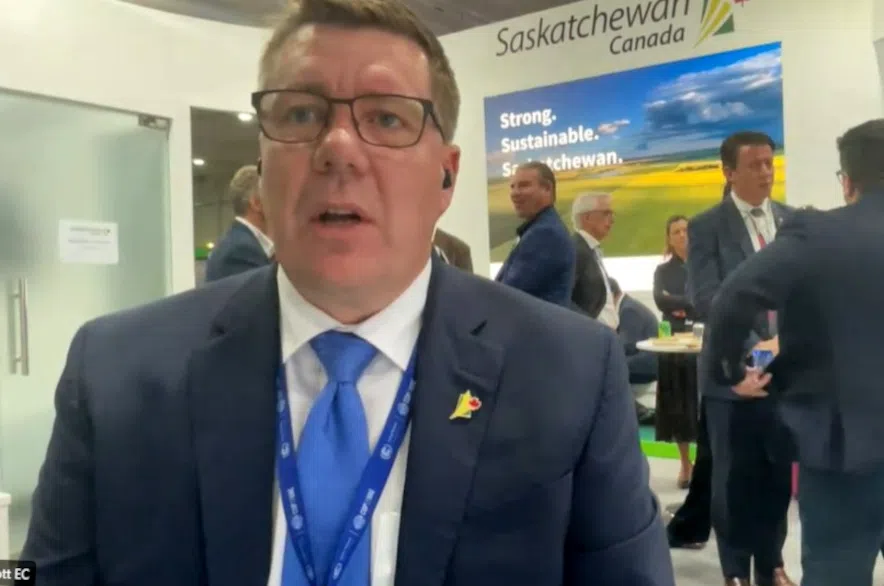Over the first couple days of Saskatchewan’s pavilion being open at a United Nations climate conference in Dubai, Premier Scott Moe said the pavilion has had good attendance and good engagement at its sessions.
The provincial government paid a pretty penny — $765,000 — for a pavilion at COP-28 and has shelled out another $238,000 on ads in Dubai. The government argued it was to tell Saskatchewan’s story while the Saskatchewan NDP argued it was a waste of money.
Speaking from Dubai on Wednesday, Moe said the pavilion has given Saskatchewan industries and companies an opportunity to talk during the climate conference.
“(It has provided them with) the opportunity to tell the how, on how they may produce their goods, the products they have in providing that energy and food security to so many allied partners around the world,” said Moe.
The premier believes there will be deliverables – something concrete to show for the time and money spent at the conference – but when asked about them, Moe talked about the agreement just signed on increasing nuclear power around the world.
Moe said it may not be a function of the pavilion itself, but a function of the broader Saskatchewan delegation being there.
“We know the role that Saskatchewan is playing, not only in fuelling those reactors with our four uranium companies and many northern and Indigenous communities that are involved in that industry in Saskatchewan, but also more recently involved in the actual nuclear power and nuclear delivery services as well,” said Moe.
The pavilion is hosting information sessions about Saskatchewan potash, agriculture, and oil and gas, which the Sask. Party government has long described as among the most sustainably produced in the world.
It also has hosted a conversation about carbon capture technology, even though it has been publicly skeptical of the commercial viability of carbon capture for natural gas in the near term, as referenced in the federal government’s net-zero power generation plan, and carbon capture on coal at Boundary Dam hasn’t performed as well as was originally expected.
Moe said the conversation around natural gas shifted away from its use for coal power generation, and more toward industrial uses for carbon that has been captured, like in enhanced oil recovery.
“If we weren’t here and weren’t present at a conference like this, I don’t know that we would be as involved in that conversation as maybe we are this week,” said Moe.
The provincial government brought a long list of companies and organizations with it to Dubai to present and show their wares at its pavilion. Those range from agriculture talking about zero-till technology and less carbon-intensive practices, to oil and gas companies talking about methane reduction and efforts toward becoming net zero.
Some of those companies aren’t from Saskatchewan, which the NDP has been critical of. But Moe said Wednesday that many have connections to the province.
“(They’re) companies that have connections into Saskatchewan, whether some of those connections are research-based, training-based or other companies that have very direct connections to Saskatchewan and, I would say, opportunities for even larger connections in the future,” said Moe.
When he spoke to media, it was Wednesday evening in Dubai and Moe planned to attend a meeting with Canada’s federal environment minister later on.
Moe said Saskatchewan is at the conference with a collaborative message on what Saskatchewan is going to contribute in terms of sustainable production, but he said there’s also a national discussion happening on things like the methane emissions announcement earlier this week.
The premier planned to raise the issue of methane emissions as well as other areas he feels the federal government is moving into provincial jurisdiction.











